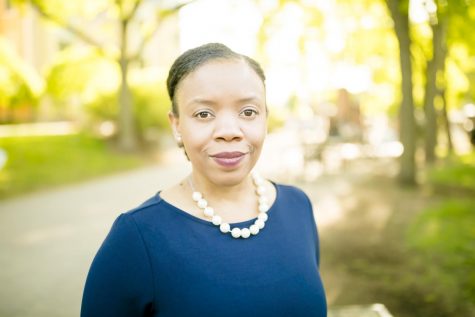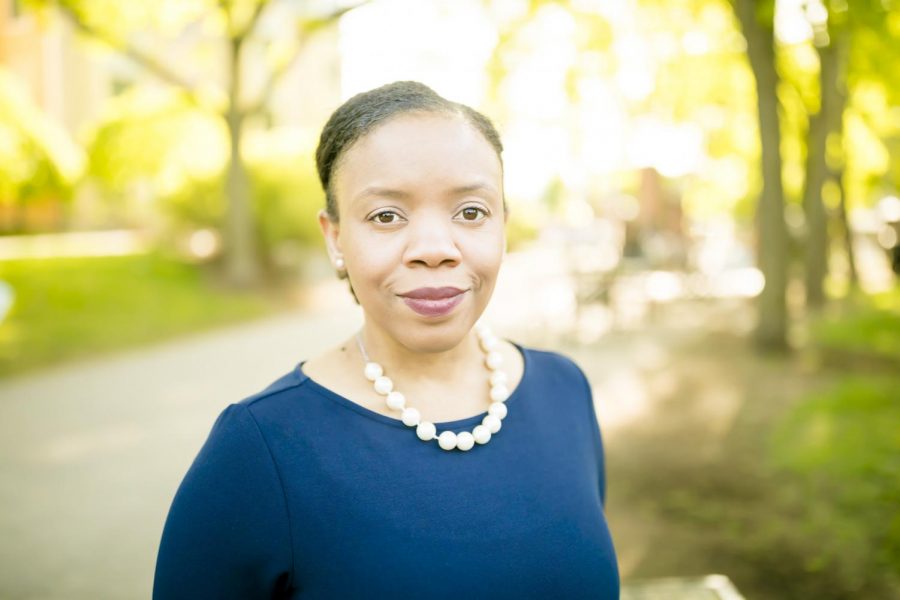Photo Courtesy of: Manikka Bowman
Manikka Bowman
Register Forum: What distinguishes you from the ten other School Committee candidates?
Manikka Bowman: One thing I pride myself on is being a balanced voice that gets things done. Since I’ve been on the School Committee, I’ve really been very intentional about leveraging the office of the committee to be able to bring people together, to have meaningful conversations that will … have a true impact on our school district. I’m also a mother, and I am a working mom on top of that. I run because I really fundamentally believe that public life can not be reserved for people that simply have the privilege of time on their hands, but people that have complex lives and need to be at the table and have their voices heard.
RF: How do you think the School Committee could be more effective—what do you see as improvements that need to be made?
MB: I believe that sometimes we get so wrapped up in these big-picture concepts … around how we want to impact public education that it blocks us from doing the basic responsibilities set out before us. Because we are so focused on solving these really big-picture problems, it blocks us from being able to do the key functions of our job that will allow the system to operate in a more effective and efficient way”
RF: How are you aiming to close the achievement gap?
MB: The way I want to tackle the opportunity—or achievement—gap … is really looking at how our system is operationalized … how do we spend money? How are we investing money? How do we work with the superintendent, based on his vision, and connecting with our principals and educators and parents to really be able to set forth a vision and stick with it until we are able to see results?
RF: What do you see as a strength of the Cambridge Public School District or a weakness that could be fixed?
MB: Our greatest strength and our greatest weakness are wrapped up in each other. We have a lot of resources … it puts us in a position where we can really invest, and not have to worry about budget cuts in the same way other districts do. That said, money is finite, and sometimes, because we know those resources are there, sometimes we take for granted that we have to make hard decisions at times, on how we spend our money if we want to be really focused on meeting the needs of the most vulnerable in our community. And, so, I think that really is one of the challenges, as well as the privileges, of living in the city of Cambridge.”

RF: I saw on your platform that you really want to address inequality for girls and minorities in the Cambridge school system; are there specific initiatives that you plan to propose in order to increase opportunities for minorities and girls?
MB: When I was first elected, Sophie Harrington came to me, and brought the proposition that the high schoolers wanted to have free access to feminine hygiene products … I was really excited that we were able to collaborate and work together to really be able to put … a policy in place that’s now just a part of our facilities budget. For me, when it comes to empowering girls and minorities it’s really about figuring out: … what are those key issues that we can collaborate … on to make the educational experience a better experience for girls as well as minorities in our school district.
RF: Are there specific initiatives or things you feel still need to be addressed that you hope to do with your next term?
MB: One thing I’m working on with one of our current School Committee members … [to take new policies and] pilot to create these infographs … so students, as well as educators and parents, can have a more friendly guide to some of the policies in our school districts … we’re looking to pilot that before the end of the year.
RF: Also about minorities and girls, I’m curious to know when you think, in a child’s education, are female and minority students most in greatest need of support. When do you think it’s most important to start initiatives and start closing the opportunity gap?
MB: It’s really complex how these gaps start … I’m not sure if you’ve heard of the imposter syndrome, where if you are a minority or a woman, sometimes the way society structures [a classroom or something] is designed to make you feel like you don’t belong. I am a mother of a little girl, and it’s something that I think of even now, in the way I speak to her and the way I speak about some of the challenges taking place in our school district. What happens a lot is we throw out these statistics about the opportunity gap—or the achievement gap—and it consistently talks about kids of color or black kids and becomes a self-fulfilling prophecy because we begin to objectify those kids and that’s just not the way in which you support young people. At a very young age … we have to be very mindful of how we talk about these issues in a way that will not isolate or marginalize people in a way that makes them doubt who they are or what they can achieve.
RF: You say that money isn’t the issue stopping universal Pre-K. What do you think is the issue—the biggest issue?
MB: The biggest issue is space … as a community, we have to figure out, how do we define universal Pre-K Is it four-year-olds? Is it three-year-olds? … And then, once we do that, getting to a place of figuring out how do you then implement a program that would allow for individuals to meet the diverse needs of their kids. Some people [with children] at the age of three or four feel comfortable with their children going into a formal educational system that is provided through the school district. Other people would prefer other things. I think that, in order for us to move forward on really providing that resource to the community, we have to define what we mean—what age are we speaking of? And then figure out, what are the resources we need? … And then figure out what the plan is.”
RF: How will you ensure that teachers and administrators are included in the decisions?
MB: Our systems are designed for us to engage the public and engage educators, and so my way of doing that is making sure whatever subcommittee I’m a part of, that whenever we have policy conversations, that we have the president of the teachers’ union there, and that parents can come, and that issues that are really complex—that can’t be solved at a regular business meeting—that we’re creating a space in those places to really have meaningful conversations. In order to be authentic as it relates to engaging educators in the community on complex issues, you have to create the space for it, and, for me, creating that space is leveraging the function of the committee, as a School Committee member, through our subcommittee systems, to be able to achieve that.
